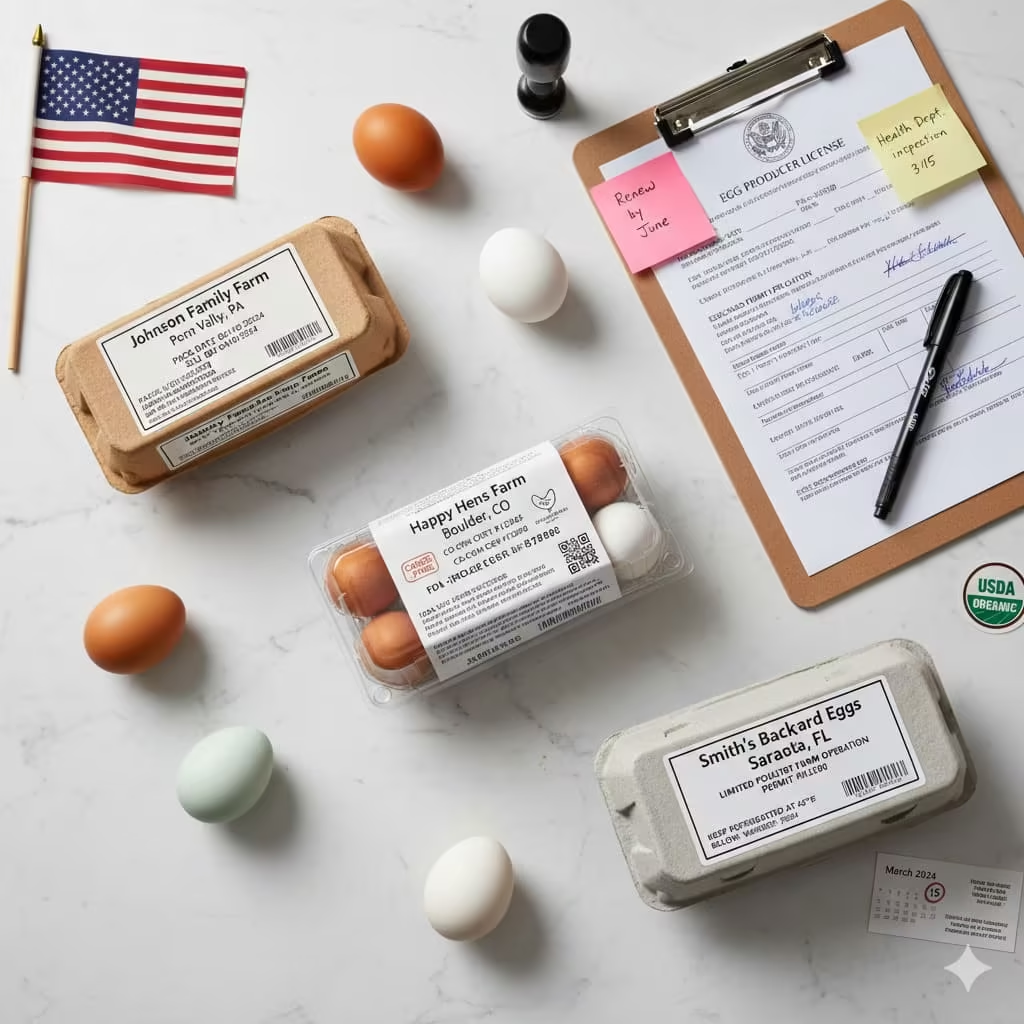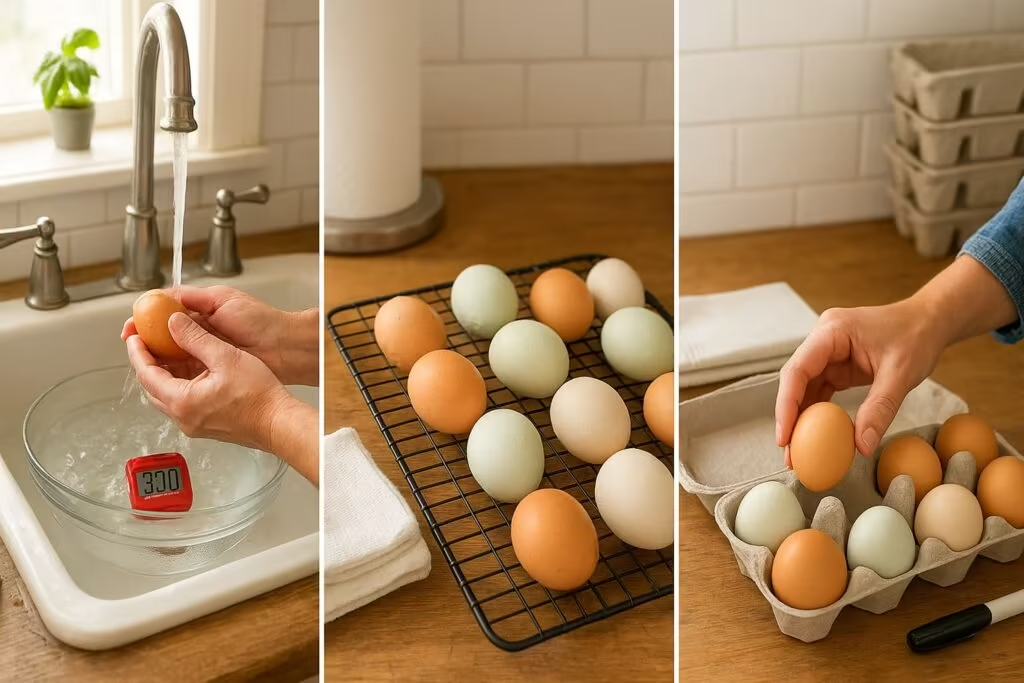Raising a backyard flock of laying hens has become increasingly popular across America, with millions of households now keeping small flocks for fresh eggs.
When your hens produce more eggs than your family can eat, selling the surplus can help offset costs and turn your hobby into a small income stream.
This guide breaks down how to legally sell your backyard chicken eggs, covering federal food safety, state rules, pricing, packaging, and marketing.
Navigating the legal landscape can seem overwhelming, but with the right information, you can ensure your operation is both safe and compliant.
Disclaimer: This guide provides general information and is current as of September 2025. Always verify with your local health department and state department of agriculture for specific requirements.
Legal and Licensing Requirements
Do you need a license to sell chicken eggs from your backyard? The answer is almost always yes, but the type of license or permit required depends heavily on your location and the size of your operation.

This section covers what you need to know about how to sell chicken eggs legally at various levels, from home-based sales to larger ventures.
Is it Legal to Sell Eggs from Home?
Generally, it is legal to sell eggs from home as a small-scale producer, but this is governed by a patchwork of state and local laws.
Some states have “cottage food” or “farm stand” laws that make it easy to get started. Others require a health department permit even for small quantities.
The key is to check with your state’s Department of Agriculture and your Local Health Department. They can provide specific guidance on permits, inspections, and sales limits.
For example, the Cornell Cooperative Extension provides guidance for New York State residents on this topic.
Federal Regulations and the FDA
What are the FDA rules for eggs? At the federal level, the FDA’s Egg Safety Rule primarily targets large producers with 3,000 or more laying hens.
The rule establishes strict refrigeration requirements and sanitation to prevent foodborne illnesses, particularly Salmonella.
For most backyard producers, federal regulations are less of a concern. State laws take precedence when selling farm-fresh eggs directly to consumers.
Organizations like the CDC and USDA also provide valuable public health information and oversight to ensure the safety and quality of the nation’s food supply.
CDC Guidelines for Safe Egg Handling
The CDC provides critical guidance on how to prevent foodborne illness from eggs, especially Salmonella. Their recommendations focus on a few key areas for both consumers and producers:
- Refrigeration: Store eggs at or below 45°F (7.2°C). While many people believe unwashed eggs can be stored at room temperature, the CDC recommends refrigerating all eggs to minimize the risk of bacterial growth.
- Proper Cooking: Always cook eggs to an internal temperature of at least 160°F (71.1°C) to kill any potential bacteria. This includes both the yolk and the white.
- Cross-Contamination: Keep eggs separate from other foods to avoid spreading germs. Always wash your hands, utensils, and surfaces with soap and water after handling raw eggs.
- Flock Management: If you have a backyard flock, the CDC recommends washing your hands immediately after handling chickens, their feed, or anything in their environment. Good flock management is key to preventing disease. Performing a regular chicken health check can help you spot issues before they affect your flock or egg quality.
State-Specific Regulations
Each state has its own regulatory framework for small-scale egg sales. Tiers are often based on flock size and sales volume.
For example, in Virginia, producers selling under 150 dozen eggs per week are exempt from most regulations. However, they must still follow basic labeling and egg storage requirements.
Laws can vary significantly from state to state. It’s essential to check the rules for your specific location, whether it’s Maine, Pennsylvania, Maryland, Michigan, Colorado, Wisconsin, or another.
State-by-State Comparison Table
| State | License Required | Flock Size Threshold | Washing Required | Special Requirements |
|---|---|---|---|---|
| Colorado | Yes (if 3000+) | 3,000 hens | Varies | Must be cage-free (2025) |
| Pennsylvania | No (under 3000) | 3,000 hens | Not specified | Sell within 5 days |
| Florida | Yes (Limited Permit) | Varies | Yes | Flats only, refrigerated |
| Wisconsin | Yes (free) | All sizes | Not specified | Registration required |
Selling Chicken Eggs in Michigan
As of December 31, 2024, a new cage-free requirements law is active in Michigan. This law requires that Michigan retailers can only sell cage-free eggs.
The requirements do not apply to farms with fewer than 3,000 egg-laying hens. Cage-free housing must provide enrichments for hens to exhibit natural behaviors.
These include scratch areas, perches, nest boxes, and dust bathing areas. As of September 2025, cage-free eggs average $3.33 compared to $2.88 for conventional eggs, according to USDA data.
Selling Chicken Eggs in Colorado
As of January 1, 2025, a new law in Colorado requires that all eggs sold in the state must be cage-free. This regulation applies to all producers who sell eggs within Colorado, regardless of their location.
To comply with the law, eggs must be labeled with “CO-COM,” “organic,” or “cage-free.” The law exempts operations with fewer than 3,000 laying hens.
So far, over 1,500 producers have received certificates for compliance. For more information, refer to the official press release from the Colorado Department of Agriculture.
Selling Chicken Eggs in Pennsylvania
Pennsylvania has strict regulations for small-scale egg sales to ensure food safety. Producers must sell eggs to consumers within 5 days of lay.
Additionally, a key rule is that you cannot reuse egg cartons from another business. Your egg labeling must also be specific.
Unless you have the eggs commercially weighed for size, they must be marked as “Unclassified.” These regulations help maintain quality and prevent consumer confusion. For more information on selling eggs in the state, refer to the Penn State Extension guide.
Selling Backyard Chicken Eggs in Florida
Florida has specific regulations for selling backyard chicken eggs in Florida. Rules depend on whether you are a small-scale producer or a larger dealer.
Individuals selling ungraded eggs from their own flock must adhere to the state’s Food Safety Act. Small-scale producers selling less than 30 dozen eggs per week may get a “Limited Poultry and Egg Farm Operation” permit.
This permit requires an annual fee and compliance with specific regulations. Eggs must be washed and refrigerated and sold only in flats. For details on Florida statutes regarding eggs, please see the provided link.
Selling Eggs in Wisconsin
In Wisconsin, all egg producers are required to register with the state, regardless of their flock size. This includes those who sell eggs directly to neighbors or at roadside stands and farmers market sales.
The registration process is free. It helps the State Department of Agriculture track producers to ensure compliance with basic food safety standards.
This requirement helps maintain the integrity of small-scale egg production and protects public health.
Selling Eggs in New York
New York has specific labeling and sales regulations that differ from other states. Producers must use new, clean egg cartons.
Their egg labeling must include the words “Farm Fresh Eggs” or “Fresh Eggs” along with the producer’s name and address.
A key requirement is that the word “Eggs” on the label must be at least 3/8″ (0.95 cm) high. This is a detail specific to New York’s regulations.
Business and Compliance Considerations
Once you’ve navigated the specific legal requirements, there are additional considerations for managing your business responsibly. These range from record-keeping to liability protection.
Record-Keeping Requirements
Keeping good records is a business best practice, and in many states, it’s a legal requirement.
You should track your daily egg production, sales dates, customer information (if required), and revenue. This helps you comply with local regulations and provides valuable data for your business.
Good records are essential for calculating your profits and losses, and a major part of that is understanding your feed expenses, which you can estimate with our chicken feed calculator and cost guide.
Insurance Considerations
For any direct sales, including roadside stands and farmers market sales, it’s wise to consider liability insurance.
While risks may seem small, selling any food product comes with potential liability. A general farm or home-based business insurance policy can protect you from claims related to foodborne illness or other issues.
This is a crucial step for serious small-scale egg production and provides peace of mind.
Getting Started: Equipment and Costs
Setting up your operation for efficiency and safety requires some initial investment. You’ll need the right tools and supplies to get started.
Equipment and Setup Costs
Beyond the cost of your backyard flock, you’ll need a few key pieces of equipment. This includes a secure chicken coop with adequate nesting boxes for your laying hens.
For collecting, a simple basket or tray works well. For processing, you’ll need cleaning supplies and new egg cartons for packaging.
A reliable refrigerated unit is a critical long-term cost to consider. It must consistently maintain the required 45°F storage temperature for food safety.
Preparing and Processing Your Eggs
Proper preparation of eggs for sale involves more than just collecting them. Understanding grading standards, cleaning requirements, and processing options is key.
This helps ensure your eggs meet legal requirements while maintaining quality and safety.

How to Prep Eggs for Sale
How to prep eggs for sale begins with cleanliness. Unwashed eggs have a natural protective bloom. This waxy coating helps with bloom preservation and prevents bacteria from entering.
You must collect eggs from laying hens at least every 48 hours to ensure freshness. This also reduces the risk of contamination.
Any eggs laid on the floor, known as mislaid eggs, should not be sold for human consumption. They are more likely to be contaminated with bacteria from dirt and feces, which is why it’s so important to know how to keep a chicken coop from smelling and maintain a clean environment.
Visibly dirty eggs are generally unacceptable for sale. Many states allow producers to dry-clean eggs with a dry brush or a light sanding sponge.
If your state requires washing, you must use a specific technique. Use water warmer than the eggs (at least 90°F), an approved egg washing compound, and dry eggs thoroughly before packaging.
Note that pasteurized eggs cannot be safely created at home. This is a complex industrial process.
The goal is to heat the egg just enough to kill bacteria like Salmonella without cooking it. This requires a delicate balance.
The temperature must be held precisely at 140°F (60°C) for about 3.5 minutes. Home methods like sous vide don’t offer the necessary level of control.
If the temperature is too low, bacteria won’t be killed. If it’s too high, the egg white will begin to set.
Attempting to pasteurize eggs at home is not only dangerous due to the risk of foodborne illness, but also impractical as it would likely result in a cooked egg.
Egg Storage and Shelf Life
How long are farm-fresh eggs safe to eat? The answer depends heavily on how they have been processed and stored. The shell of an egg is porous, and a natural protective layer called the bloom is its first line of defense.
- Unwashed Eggs: If an egg is unwashed, the bloom remains intact. It can be stored at room temperature for a period. For maximum safety, the CDC recommends refrigerating all eggs. They should be stored at a consistent temperature of 45°F (7.2°C) or colder to prevent spoilage. When stored properly, unwashed eggs with their bloom can last for several weeks.
- Washed Eggs: Washing an egg removes the bloom, leaving it more vulnerable to bacteria. For this reason, once an egg is washed, it must be refrigerated immediately. Washed and refrigerated eggs are typically good for about 3-5 weeks. It’s important to package them in a clean egg carton that protects them from damage and provides adequate egg storage conditions.
How to Grade Eggs at Home
How to grade eggs at home involves evaluating both the size and quality of eggs. Egg sizing is based on weight per dozen, with categories like jumbo, large, and medium.
While specific requirements vary, USDA standards provide a common framework. Quality grading examines factors like shell cleanliness, shape, and texture. It also looks at interior quality through candling.
Candling involves holding the egg up to a bright light to check for interior defects. You’re looking for a small air cell, an indistinct yolk outline, and a clean, firm shell.
The most common quality grade you will see in stores is Grade A eggs.
Packaging and Labeling
How to package eggs for sale is a crucial step for both compliance and marketing. Your state’s laws will dictate whether you can reuse egg cartons.
They also dictate what information must be on the egg labeling.
Legal Labeling Requirements
All states that regulate egg sales require certain information on egg cartons. Common requirements include the seller’s name and address, a statement of identity, net contents, and storage instructions.
These are all part of federal Food Labeling Regulations. Many states also require a packaging or sell-by date, grade and size information, and safe handling instructions.
A clear, well-designed label ensures compliance and builds a sense of professionalism and trust.
You can also voluntarily comply with the National Organic Program if you choose to market your eggs as organic eggs. This requires specific feed and record-keeping standards.
Calculating Your Egg Pricing for Profit
Setting the right price for your eggs requires balancing production costs, market rates, and customer expectations. Understanding your true costs helps ensure your egg sales generate a profit.
This is better than just offsetting expenses.
How to Calculate Egg Price
How to calculate egg price starts with understanding your costs. The simplest way is to total up ongoing expenses like chicken feed, supplements, and packaging.
Then, divide by the number of dozens you produce. This will give you your cost per dozen.
You can also consider more detailed calculations, such as how to calculate eggs per gram. To do this, weigh a sample of your eggs to determine their average weight.
While this may be unnecessary for small-scale sales, it can help you understand your product’s value.
Understanding the Market
So, what is the price of raw eggs from a backyard flock? Farm-fresh eggs typically command premium prices compared to store-bought eggs, especially if you can highlight special qualities like free-range chickens, pasture-raised, or non-GMO feed.
Price your eggs competitively while ensuring profitability.
Many small producers find success pricing their eggs 20-50% higher than store prices, justified by their superior freshness and quality.
Regional Price Variations
Egg prices can vary significantly depending on your location. Factors like local supply and demand, transportation costs, and the general cost of living all play a role.
Eggs sold in urban areas or regions with a strong “buy local” movement may command a higher price. This is compared to those in more rural areas.
Always research prices at local farmers market sales or roadside stands in your community to ensure you are competitive.
Thinking in Bulk
For those considering larger buyers, you might wonder how much money is 1000 eggs. Since a dozen eggs is 12, 1000 eggs equals approximately 83.3 dozens.
If you sell at an average price of $6 per dozen, 1000 eggs would bring in about $500. This is not accounting for your costs.
This calculation helps you scale your business and plan for larger opportunities.
Where and How to Sell Your Eggs
Choosing the right sales channels depends on your production volume, time available, and local regulations. Each sales method has distinct advantages and regulatory requirements.
Selling Eggs from Home and at Farmers Markets
How to sell eggs from home is often the easiest method, especially if you have a small backyard flock. It requires minimal logistics.
You can set up a small stand with a cooler and an honor system cash box or a QR code for mobile payments.
Selling at farmers market sales offers a great way to reach a larger audience and interact directly with customers. Other local options for selling nest run eggs include roadside stands and gate sales.
Marketing Strategies
Beyond setting up a stand, successful backyard egg businesses rely on smart marketing.
Use social media like Instagram to share photos of your happy free-range chickens and delicious yolks.
Create a local Facebook group to post updates on availability and answer questions.
For a simple but effective strategy, rely on word-of-mouth from satisfied customers. You can also use simple local advertising, like a sign in your yard.
The key is to highlight what makes your eggs special. This could be freshness, the care for your backyard flock, or the vibrant yolks.
Selling Eggs Online
How to sell eggs online has become a popular option. You can use social media platforms like Facebook or Instagram, or local community groups.
The key is to clearly communicate how customers can pick up their eggs or if you offer delivery.
If you wonder can I sell eggs online and ship them, the answer is generally no. Federal and state laws for food products can be complex.
They typically require a higher level of certification and inspection that most small-scale producers cannot meet.
Selling Eggs to Commercial Buyers
How to sell eggs to grocery stores or restaurants typically involves more regulatory hurdles.
These buyers will likely require you to have a permit. You’ll also need to meet specific grading, packaging, and labeling standards.
If you can meet these requirements, selling wholesale can provide a consistent and reliable income stream.
Conclusion
From navigating state laws and proper egg handling, to building a loyal customer base, you’re now equipped with the knowledge of how to legally sell your backyard chicken eggs.
You can turn your hobby into a thriving local business. The most successful operations are built on a foundation of quality, transparency, and a genuine connection with the community.
Remember to always prioritize safety and compliance. These are the cornerstones of a successful and sustainable enterprise.
Frequently Asked Questions (FAQs)
1. How long do farm-fresh eggs last?
Unwashed eggs with the natural protective “bloom” can last for several weeks at room temperature and even longer in the refrigerator. Once an egg is washed, it must be refrigerated and is typically good for about 3-5 weeks.
2. Why do my backyard eggs have such vibrant, deep-orange yolks?
The color of the yolk is a direct result of a hen’s diet. Hens with access to a varied diet of fresh greens, insects, and other foraged treats will produce richer, deeper-orange yolks compared to hens fed only commercial feed. This is a great sign of a healthy hen!
3. Do I need to wash my eggs before selling them?
This depends on your state’s regulations. The natural bloom on an unwashed egg protects it from bacteria. Many states allow you to sell “unwashed” eggs as long as they are visibly clean. If you choose to wash them, use water warmer than the egg itself and dry them immediately to avoid pushing bacteria through the shell.
4. Is there a difference in nutrition between brown and white eggs?
No. The color of the eggshell is determined by the chicken’s breed and has no bearing on the egg’s nutritional value, flavor, or quality. The egg’s flavor and nutrient content are influenced solely by the hen’s diet and health.
5. Can I reuse old egg cartons?
This varies by state. Some states permit reusing clean, unbranded cartons, while others require new ones. Always check your local regulations. Even in states that allow reuse, it’s a best practice to cover any old labels to avoid consumer confusion and prevent the potential transfer of pests like mites and lice on chickens from one flock to another.

Oladepo Babatunde is the founder of ChickenStarter.com. He is a backyard chicken keeper and educator who specializes in helping beginners raise healthy flocks, particularly in warm climates. His expertise comes from years of hands-on experience building coops, treating common chicken ailments, and solving flock management issues. His own happy hens are a testament to his methods, laying 25-30 eggs weekly.
